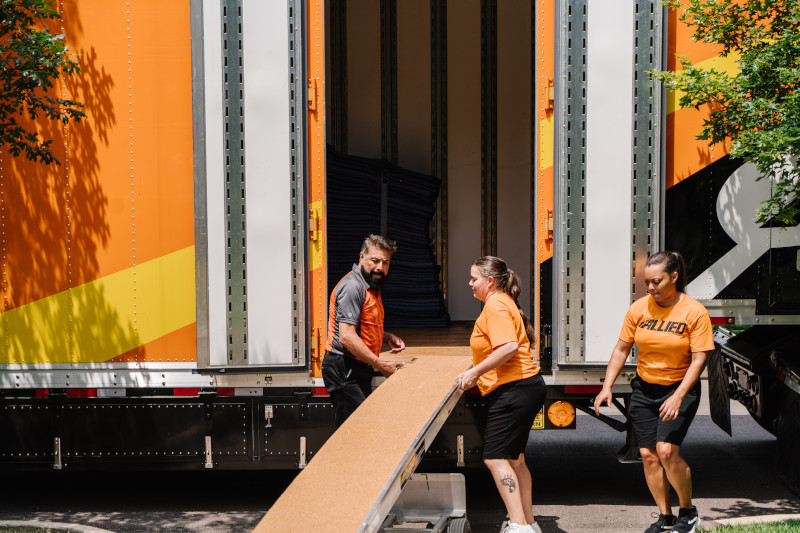It’s hard to sum up what a professional mover would cost. This is because moving companies are typically regulated by two entities. On an interstate move the regulatory body is the Federal Motor Carrier Safety Administration. On a move within a state or commonwealth the moving company is typically under the jurisdiction of a state or commonwealth level regulatory authority.
Interstate moves are based on the weight of the shipment plus the mileage it travels plus any packing services or needed third party services. Local moves (typically under 40 miles but not over state lines) are typically done on an hourly basis plus any packing or required third party services.
Intrastate moves (typically 40+ miles and not over state lines) are typically done on a weight and mileage basis plus any packing and required third party services. When calling a moving company; it is important in addition to receiving a price to inquire how the final charges will be calculated. It also behooves you to do your research. For an interstate move sites such as https://www.fmcsa.dot.gov/ and https://www.trucking.org/moving-storage-conference are good resources for seeing how movers are regulated.
Packing charges (materials and labor to pack them) can vary. Typically, on an interstate move there is a set charge for the box based on size and a set labor rate for packing it. Movers can also apply a per hundred weight charge that includes the packing service based on the weight of the whole shipment.

On local moves packing may be done the same or in some areas it may include the materials cost but the labor is done hourly.
Much of how the charges are calculated will be based upon your geographic area and the regulatory body in play and the tariffs your mover has filed with that regulatory authority.
Are moving companies worth the cost?
Paying a full-service mover is almost always going to be more expensive than a do it yourself move or the many partial do it yourself options on the market.
The advantages of hiring a moving company are many though. First, it takes much of the planning and as much labor as you prefer off of your plate. It is the moving company’s responsibility to get a truck and qualified driver on-site and have the qualified labor in place to assist him.
If you opt for full service packing it is the moving company’s obligation to get qualified packers on-site and bring all the materials to the site that will be required to professionally pack your shipment. DIY packing requires you to buy, pick up or ship the materials and do all the labor required to pack the goods up. When you DIY packing these cartons are considered PBO (packed by owner) and the mover’s liability on them is conditional. When the mover packs the cartons, those cartons are considered CP (carrier packed) and the carrier is liable for any damaged items within them.
When you move yourself with a rental truck or portable container you have to acquire your own labor. This potentially brings your homeowners insurance into play if someone gets hurt. Depending on your age your friends may be beyond the point of moving furniture for a few slices of pizza and a beer or two. Additionally, while a mover is liable for residence damage, the labor you cause on your own is at no obligation to repair any potential residence damage they do. Without the written assurance of repairs from the mover this could negatively affect your closing date.
Moving companies are liable for your goods under which ever valuation option you select. This includes anytime it is in their custody and control and while being loaded and unloaded. It is important you inquire about what your valuation options are. If you are getting a rental or portable container read the fine print very carefully to see if they cover damage if their equipment leaks or is in an accident or has structural vices that lead to damage of your goods.
How many movers should I hire?
If you are getting a professional mover they will be able to make this determination for you. They will base this off the size of your shipment and the presence of inordinately heavy items such as pianos, safes, hot tubs, etc. If you are doing your own move typically you would want at least 3 people for 5000# and 1 additional person for each additional 5000#. There are many factors to consider though. These industry averages are strictly for loading or unloading these shipment weights. If you need to load and deliver the shipment the same day with inexperienced labor you will probably want significantly more people.

Most moving companies will provide you with labor to load a portable container or rental truck. However most moving companies only entertain taking this business if they do not have full service moves they can schedule instead. Full service customers will typically always be given scheduling priority. Typically, these services will be done by the hour and the mover will assess a minimum number of hours that protects their cost plus profit margin for having a crew report into work that day.
Will a moving company store my goods?
Nearly all moving and storage companies have warehouses where they can provide safe storage of your goods. These warehouses are typically secure, manned daily, have heating and moisture control systems in place along with fire suppression systems and security systems.
A great question to ask your mover would be “Is this warehouse military approved?” The Dept of Defense has very stringent requirements for a warehouse to be military approved and does random inspections on these warehouses.
If you want to know where your goods will be stored, ask to see it. A mover who runs an efficient, well maintained, clean warehouse will be quick to tell you they would be happy to show you around. A mover whose warehouse standards are poor will be quick to cite something like “due to insurance that is not possible” or set your visit sufficiently far off to have time to make it presentable.
Mover’s liability & insurance
Movers are liable for your goods while they are moving them and while they are in their custody and control. It is important to note that mover’s liability is valuation NOT insurance. Valuation assigns a value to the goods that will apply if there is damage or loss.
Most movers have at least two and in some cases three or more options of valuation. It is important you have your salesperson illustrate all your options. It is also important if you are scheduling storage services that you make yourself aware of what your storage valuation options are.
If there is any damage the mover’s first option is to have a qualified technician do repairs. If this is not plausible the mover must then compensate you BASED ON THE VALUATION LEVEL YOU SELECTED.
To reiterate there is some variation on mover’s liability on PBO (packed by owner) and CP (carrier packed) cartons. On CP cartons the mover is liable for anything in the box that is broken, no questions asked. The mover was responsible for the materials the labor and the handling. Thus, the mover is at fault.
On PBO cartons the mover’s liability (in most jurisdictions) applies on conditions that can be visibly seen. The carton is missing (not visually present or checked off on the inventory), it is water damaged, it is crushed, has a hole in the side or is open. In these circumstances the mover’s liability would be in play. If the carton is present and devoid of any visible defects this is deemed “faulty packing” and the mover is not liable for damaged contents.
While insurance has no impact on a mover’s liability for your goods, movers do carry a considerable amount of insurance. Workers compensation insurance in case someone gets injured. Auto insurance which is sometimes two-fold. A mover may have auto insurance that covers their interstate operations and a separate insurance carrier that covers their intrastate operations.
Many movers have an insurer in place to cover a catastrophic loss situation such as a bad traffic accident or a warehouse fire. In these cases there may potentially be insurance that comes into play for your goods.
Most movers also carry warehouseman’s insurance which may come into play in the event of a catastrophic event to their warehouse and the goods contained within.
You are always within your rights to confirm what insurance your selected moving company has in place. Movers are typically able to get copies of their general liability certificate of insurance. Some large residential living complexes require us to provide copies of them.
What will and WON’T movers move?
Guns: Some movers will transport them, some will not. It is important that you not assume they will and ask your relocation consultant if its an option and what additional paperwork it will entail.
Generally, if its flammable, corrosive, explosive, will cause staining, is a liquid or is highly odorous movers will not take it. This is a lot of items such as gas, kerosene, bleach, perfume, pressurized gases or materials, cleaning products, gun powder, Tannerite, etc, etc. It is important to discuss this with your relocation consultant and most moving companies will have a list they can email you or have it posted on their website.
As moving day looms have a back up plan for anything of this nature the van foreman tells you he cannot put on the truck.
Can I help the movers? Tips?
Yes and no? You definitely cannot team carry a piece with a mover (insurance) and you definitely cannot get in the truck (insurance) or use the mover’s equipment (insurance.)
If you are doing a weight basis job there’s no fiscal incentive for you to help other than shortening the day. So why would you want to? You are paying for it so let the mover do the work.
This question is most typically used by people who are moving by the hour. If you want to help reduce your costs you can carry boxes from within the house and stage them in the garage or on a covered porch or if there is 0% chance of rain in the driveway. Some crews may even let you set them on the tailgate of the truck and as they need boxes load them from there.
If you are doing this or loading vehicles in your personal vehicle or a rental truck it is imperative you coordinate with the driver so that you are not working against each other and causing each other undue hardship.
Tips are NOT expected ever and any mover who insinuates they should be tipped is unprofessional. Most moving companies typically allow their staff to accept tips. Any tip is appreciated. As for size of tip that is up to the customer to decide.
Factors that may weigh into that are the time on-site. The tip for a 3 man crew who worked for you for three hours is probably going to be smaller than for the crew that packed, loaded and delivered your 24,000# as they were with you at origin and destination for probably 4-6 days.
If you were really pleased with the efficiency and professionalism and skill of your crew and are able to tip and would like to tip, by all means, please tip away!
